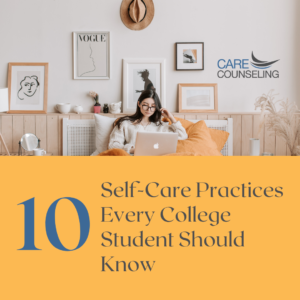10 Self-Care Practices Every College Student Should Know
 College life is an exciting and transformative journey, but it’s also a period filled with academic pressures, social challenges, and personal growth. To thrive during this time, it’s crucial for college students to prioritize self-care. Self-care isn’t just about bubble baths and face masks; it’s about nurturing your physical, mental, and emotional well-being. In this blog post, we’ll explore ten essential self-care practices that every college student should know.
College life is an exciting and transformative journey, but it’s also a period filled with academic pressures, social challenges, and personal growth. To thrive during this time, it’s crucial for college students to prioritize self-care. Self-care isn’t just about bubble baths and face masks; it’s about nurturing your physical, mental, and emotional well-being. In this blog post, we’ll explore ten essential self-care practices that every college student should know.
- Establish a Consistent Routine
College life often lacks the structure of high school, and it’s easy to fall into irregular sleeping patterns and unhealthy habits. To combat this, establish a consistent daily routine. Set regular sleep and wake times, allocate time for classes, study sessions, and breaks, and try to maintain this schedule as closely as possible. A routine can help you feel more organized and in control.
- Prioritize Sleep
Sleep is your body’s natural way of recharging and recovering. Skipping sleep to cram for exams or socialize can lead to fatigue, poor concentration, and increased stress. Aim for 7-9 hours of quality sleep each night. Create a sleep-conducive environment, limit caffeine intake in the afternoon and evening, and avoid screens before bedtime.
- Nutrition and Hydration
Eating well is a fundamental aspect of self-care. Ensure you have a balanced diet rich in fruits, vegetables, whole grains, and lean proteins. Avoid excessive consumption of processed foods and sugar. Stay hydrated by drinking plenty of water throughout the day, which can help improve focus and overall well-being.
- Regular Exercise
Physical activity is not only essential for your physical health but also for your mental and emotional well-being. Engage in regular exercise, even if it’s just a short walk or a quick home workout. Exercise releases endorphins, which can boost your mood and reduce stress.
- Mindfulness and Meditation
College life can be overwhelming, and stress is a common companion. Incorporate mindfulness and meditation practices into your routine. These techniques can help you manage stress, improve focus, and enhance your overall sense of well-being. There are many apps and online resources available to guide you in mindfulness and meditation exercises.
- Social Connection
Maintaining meaningful relationships with friends and loved ones is vital for your mental health. Make an effort to connect with others, whether through in-person gatherings, phone calls, or video chats. Social support can provide a sense of belonging and emotional stability during challenging times.
- Set Boundaries
Learning to say “no” and set boundaries is an essential aspect of self-care. College life often presents numerous opportunities and obligations, but overcommitting can lead to burnout. Prioritize your well-being by setting realistic boundaries and focusing on what truly matters to you.
- Seek Help When Needed
College can be a time of personal growth and exploration, but it can also be a period when mental health challenges arise. If you find yourself struggling with anxiety, depression, or other mental health issues, don’t hesitate to seek help. Most colleges offer counseling services, and there are various online resources available to connect you with professionals who can provide support.
- Time Management and Organization
Effective time management and organization skills can significantly reduce stress levels. Use planners, calendars, or digital tools to keep track of assignments, deadlines, and important dates. Break tasks into smaller, manageable steps to avoid feeling overwhelmed.
- Pursue Hobbies and Interests
Don’t forget to make time for activities you’re passionate about outside of your academic pursuits. Engaging in hobbies, sports, or creative endeavors can be a refreshing way to relax and recharge. It provides a sense of accomplishment and balance to your college life.
Self-care is not a luxury; it’s a necessity, especially for college students juggling academics, social life, and personal growth. By incorporating these ten self-care practices into your daily life, you can improve your overall well-being, manage stress, and set a foundation for long-term health and happiness.



























